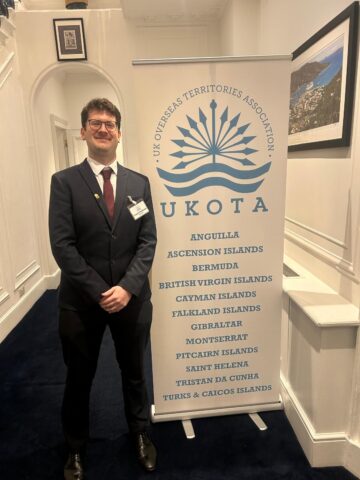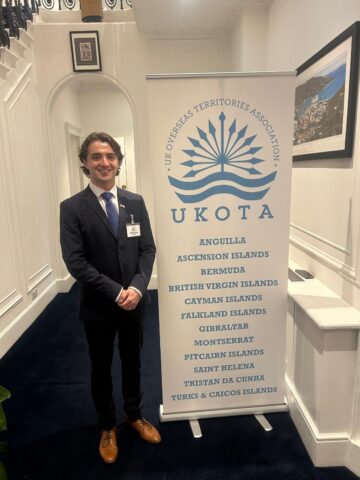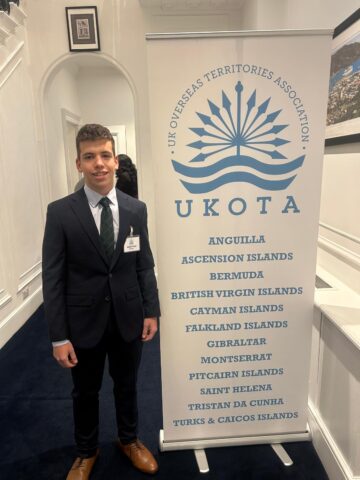Young Gibraltarians represent community at London international political events
Three young people were selected to represent Gibraltar at international political events in London this week.
The first event was the UK Overseas Territories Association’s [UKOTA] Youth Summit, held on Thursday, and the second is the UK Youth Parliament, which takes place on Friday.
UKOTA is the umbrella organisation which groups together the different inhabited UK Overseas Territories.
The selection process for the UKOTA event followed an essay competition on the subject of ‘Diversity and Inclusion’.
Here, we publish the winning essays by Francis Devincenzi and Johan Perez, the official Gibraltar delegates to the UKOTA Summit.
We also publish the winning essay for the UK Youth Parliament in the House of Commons, written by James Vinet, who will represent Gibraltar at this event.
The theme for that essay was ‘Education and Learning: School/College and Access to University and Apprenticeships’.

UKOTA Youth Summit
Diversity is the watchword
By Francis Devincenzi
Diversity is the watchword of the Overseas Territories (OTs). A product of the reach of the British Empire, the multitude of histories, peoples, and geographies that encompass the territories provides innumerable examples of diversity in action. Gibraltar, the sole European territory, has one of the more colourful and diverse histories under the Phoenicians, Moors, Spaniards, and British. Our sense of distinct Gibraltarian peoplehood disguises multifarious origins, ranging from Italy to North Africa to the Indian subcontinent: an inevitability considering Gibraltar's geographical significance as a naval base and international hub. This diversity is echoed (literally) in Gibraltar's language, Llanito. Our attainment of civil and political rights coincided with the birth of multiculturalism in Britain, and it is a testament to the prevailing sense of community and syncretism in Gibraltar that such an increasingly diverse community continues to flourish.
Bermuda underwent a similar revolution in the 1960s, as the explicit racial divide finally sought to be redressed. Britain's oldest continuously inhabited territory, having been settled in 1609, was marred by the scourge of slavery. Although abolished in Bermuda in 1834, effective segregation between the 'black' and ·white' communities continued into the 1960s. Taking inspiration from the American civil rights and Black Panther movements, black Bermudians initiated a Theatre Boycott in 1959 that significantly contributed to the desegregation of Bermudian society. This was only a preliminary step in the search for social and racial justice in Bermuda and much remains to be done to bridge the divide. Bermudian society is inherently diverse and dynamic despite these historical injustices. A testament to this is the assimilation into Bermudian society of four former Uyghur detainees at Guantanamo Bay, taken in 2009 by Premier Ewart Brown despite British protestations, who were eventually granted citizenship in 2018.
In the far-flung South Atlantic, the Falkland Islands present an unlikely example of a flourishing, diverse society. Settled in the 1830s by predominantly Welsh and Scottish migrants, the islands have experienced war and neglect but have thrived despite these challenges. The war in 1982 reinvigorated British interest in the archipelago, and the designation of an exclusive economic zone and new investment has attracted international immigrants, from the Philippines to France, as temporary workers. Notably, a proportion of the population originates from St Helena, another OT. Due to the Argentine claim, there is limited interchange with South America, but many Falklanders have Chilean ancestors: for instance, Leona Roberts, a member of the Legislative Assembly.
In the spirit of inclusion, UKOTA should consider symbolically extending invitations to representatives of the displaced Chagossians, whose legal battle seeking a right to return to their archipelago is ongoing. Their plight should strike a particular chord with Gibraltarians, considering the British contemplation of a similarly enforced exile during the evacuation of the civilian population during the Second World War. Such a step would affirm UKOTA's significance as a collective platform, and ensure that celebrating diversity is not mere tokenism, but a show of strength that affirms mutual solidarity in seeking better futures for all the OTs.

UKOTA Youth Summit
Embracing multicultural identity
By Johan Perez
The UK Overseas Territories (UKOTs) are a collection of 14 territories spread across the globe, each with unique histories, cultures and peoples. As part of the British Family of Nations, these territories have managed to balance the need to have close ties with the UK while simultaneously preserving and fostering their own distinct cultural identities. Amongst these diverse territories, Gibraltar stands out as a vibrant and diverse society where multiple cultures and ethnic backgrounds don't just coexist but live in harmony, serving as an example to the world of what can be achieved if humans decide to respect and embrace each other's differences. As the global awareness of cultural and ethnic diversity grows, it is crucial to examine how Gibraltar promotes these values central to freedom and democracy, ensuring equitable representation and opportunities despite one's background despite global challenges.
The UKOTs vary significantly in their demographic composition, shaped by historical migration, colonial influences, and economic opportunities. Territories such as the Cayman Islands and Bermuda have diverse populations due to international business sectors, while places like Tristan da Cunha and the Falkland Islands have smaller, more homogenous communities. Despite these differences, diversity is a key aspect of life in all UKOTs, and efforts are being made to enhance inclusion through legal frameworks, policies, and community engagement.
Gibraltar has historically been a cultural and religious melting pot and people from around the commonwealth and the wider world have made Gibraltar their home over the past three hundred years. Today, this legacy is reflected in its inclusive approach to governance, business, and social life. Gibraltar has made significant strides in promoting inclusivity through legislation and policy. The territory upholds the principles of the UK's Equality Act, ensuring protection against discrimination based on race, gender, disability, and sexual orientation. Recent advances in LGBTQ+ rights, including the legalisation of same-sex marriage in 2016, highlight Gibraltar's commitment to progressive values. Moreover, the government actively supports gender equality through initiatives aimed at increasing female representation in leadership positions. Disability access and employment opportunities for individuals with disabilities are also areas of focus, with efforts to improve public spaces and workplace accommodations.
Looking ahead, Gibraltar must continue to foster inclusive policies that embrace its multicultural identity. Strengthening anti-discrimination laws, increasing awareness campaigns, and promoting diversity in education and the workplace will ensure a brighter, more equitable future for us all. By leveraging our unique position as a bridge between Europe and the UK, Gibraltar can set an example for other UKOTs in embracing diversity and inclusion as core societal values.

UK Youth Parliament
A shared role in education
By James Vinet
Thirsty? Open the tap
Clean and plentiful water is there, always readily accessible to us. We give little thought to its availability, taking for granted what is for millions around the globe a luxury. The same can be said of Education. Although we can survive without Education, it is essential not only in order to learn, to understand, to question established principles, but also to thrive, to prosper, to create opportunities and to improve the lives of us students and our families. And while we in Gibraltar are fortunate to have it available ‘on tap’, with His Majesty’s Government of Gibraltar having since the 1980s guaranteed access and, crucially, full funding to higher education, as well as to apprenticeships, others are much less fortunate. That effortless access to Education that we enjoy, is not something that we should ever take for granted. It is of no surprise that the Commonwealth, of which Gibraltar is a proud and committed member, places such great emphasis on the creation of opportunities for youth employment and entrepreneurship.
As a matter of fact, amongst the Commonwealth's core beliefs, is protecting access to education along with the importance of young people. Ensuring and facilitating our access to further education and to apprenticeships, is something that the wider community, not just locally but also internationally, has a role to play in. As students, of course, we must work hard in our studies and in weighing up our future career prospects. It is, after all, our decision, our free will, and we must ultimately take ownership of the university degree or apprenticeship we wish to pursue. Our teachers, schools and colleges, as well as parents, also have their respective roles to play in providing support and guidance. School pupils and students are faced with multiple distractions, mental health issues and other challenges, with worries and uncertainties and a host of other obstacles. Therefore it is important that there is suitable support from educational establishments and parents.
And what about industry? What about the private sector? They also have a major contribution to make. Gibraltar, and the entire world, is experiencing an increasingly competitive employment market. We live in an era of economic uncertainties and unprecedented threats to peace and security. Change is a constant, as they say, but that change is now more fast-paced than ever. The continuous advancement of technology and the speed with which Artificial Intelligence is impacting different fields of work means that roles are diversifying and adapting. Whether in accountancy or in law, whether in manufacturing, finance, teaching or just about any other field, things are constantly changing. And they are changing fast. It is therefore important that the private sector interacts with schools and with students, to inform them of what their future needs will be. It is the role of future employers to guide their future employees. If a bank needs fewer Economics graduates but more IT experts, or if an accountancy firm plans to rely more on Al, that information must trickle down to schools and colleges.
It is in everyone's interest that this is so. If we are lucky enough to have access to universities and apprenticeships, as previously indicated, let us make every effort to guarantee that there is employment available at the end of the process.
Are there other organisations with a role to play? In many parts of the world, lack of access to education is down to poverty or the physical reality of living hours away from the nearest school. Technology, for example via online learning, can in some cases help bridge the financial and geographical gap. But for some, access to education is a legal and not just physical impossibility. In Afghanistan, the Taliban government is depriving millions of girls and women of an education. There, females are forcibly prevented from attending schools and universities. According to the United Nations, "the future of an entire generation is now in jeopardy."
Perhaps I'm being too simplistic or too naive for a 17- year old. However, I believe that unless there is international pressure from the UN, the European Union, and other influential bodies like the Commonwealth, injustices like these will stay unchanged.
So we all have a shared role in Education. We all, together and collectively, must work together to ensure young people continue to have access to universities and apprenticeships. Students, parents, educators, educational establishments, and more widely governments and international bodies like the Commonwealth, as a compelling force for good and as a network for co operation, with its shared principles and values, also need to apply pressure and to advocate for the benefits of Education.
Let us all, together, ensure that everyone has access to clean water, as well as to Education. T he thirst for knowledge must always be celebrated, as well as facilitated.









